Introduction
The data download utility in Track 'n Trade Pro, "FIDO", is simple to use.
Easily control the commodities that you download with the Commodity Chooser and
keep current with FIDO.
Commodity Chooser
The Commodity Chooser is a utility for managing commodities for data downloads
and display in the Commodity tab.
Opening the Commodity Chooser:
Click on the View menu and select "Commodity Chooser" or click on the Commodity
Chooser button on the main Toolbar.

Selecting/Deselecting Commodities:
You may select/deselect futures and options data for each commodity by clicking
on the appropriate check box. The options data is only available if you own the
Options Plug-in and the Futures & Options Data Subscription service.
If you would like to select all futures/options or deselect all futures/options
data click on the + and - buttons at the end of each column.
Note: Saved Chartbooks containing charts from commodities that you have removed
from the Chart Window, will not be affected by the Commodity Chooser. This
utility will not delete data from your hard drive. You will still be able to
access your previously saved charts. The Commodity Chooser will only hide this
commodity from the Commodity tab and from the daily data downloads.
Adding Commodities:
When you add commodities to your data set, FIDO will retrieve any missing
historical data for the commodity on the next data download.
Limit Historical Data:
If you would like to limit the contracts listed in the Commodity tab drop down
menu, select the "Limit History to ___ years" and then select the number of
years preferred in the drop down menu.
Note: This option does not change the amount of data stored on your hard drive,
it simply controls the data that is displayed in the Commodity tab. If you were
to manually type the symbol (in the symbol search) for a chart not seen in the
menu, it would still be displayed.
Commodity Chooser Window in Track 'n Trade Pro:
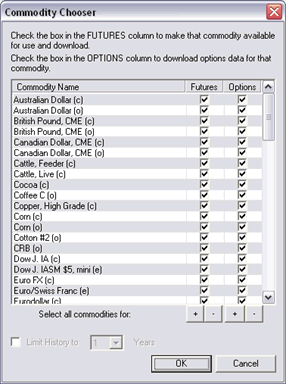
Back To Top
Data Download Utility

To perform a Data Download:
Click on the Data icon (shown above) on the main Toolbar. Track 'n Trade Pro
will close and the data download program - "FIDO" will open.
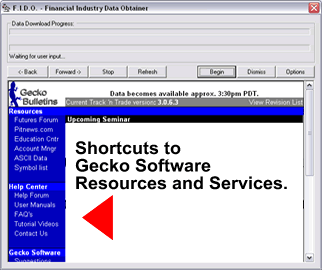
Note: When the program closes, all changes are saved on your working charts and
will be reopened to the last chart you were working on when finished.
Before opening FIDO, Track 'n Trade Pro will check for product updates. If an
update is available you will be notified and given a window to choose "Yes" or
"No" on the update. It is recommended that you install each update as it becomes
available. After you are finished with the program update, you will be returned
to FIDO.
If the data update does not begin automatically, click on "Begin" to start the
data update. Watch the status bar to see the progress.
When the data update is complete the following window will appear:
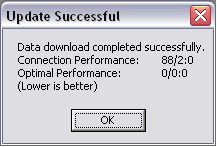
Click on the "OK" button and then the "Dismiss" button to exit FIDO. You will
notice that the bottom status bar will display "Data Current" when finished.
Note: FIDO is able to detect the last day of data available in your database.
Therefore, if you add a commodity or miss a couple of days, your data will be
completely updated upon the next data update.
To Stop a Data Update:
If you need to end a data update before it is finished with all of the
contracts, click on the "Dismiss" button. This will signal the FIDO to end the
update after the current commodity is finished.
Note: Do not press the power or reset buttons on your computer if FIDO freezes
and you are unable to close the window. If this happens, press the buttons Ctrl,
Alt, Del (Delete) all at the same time to open the "Windows Task Manager" (Only
press them ONCE). Next, select FIDO.exe from the list and click on the "End
Task" button. This will close FIDO and allow you to restart Track 'n Trade Pro.
Back To Top
Data Tab
The Data tab is the tab with the graphic that looks like a spreadsheet.
Click on the tab and it will expand to say "Data" as you see in the
screen shot below. This tab shows the data values for the current
contract that are shown in the Chart Window. The Data tab has values for
the Date, Open, High, Low, Close, Volume, and Open Interest, shown as
the default. You can also choose to view the indicator values, see
Customizing the Data Tab later in this section.
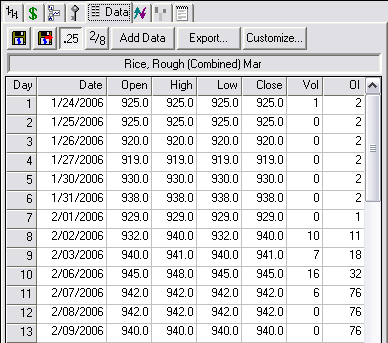
 The
disk button with the green arrow (left) is used to save any changes you
have made to the data in the Track 'n Trade Pro database, so that they
are available the next time you run the software. You can use this
feature to adjust the Open, High, Low, Close, Volume, and Open Interest
values if needed. The
disk button with the green arrow (left) is used to save any changes you
have made to the data in the Track 'n Trade Pro database, so that they
are available the next time you run the software. You can use this
feature to adjust the Open, High, Low, Close, Volume, and Open Interest
values if needed.
Note: If you have any questions regarding the data in Track 'n
Trade Pro, please contact the Technical Support Department at
800-862-7193 or 435-752-8026 Mon-Fri Mountain Standard Time.
 The
disk button with the red arrow on it (right) is for undoing any data
changes you have made but have not saved. You can change a value in
Track 'n Trade Pro and see the results of that change on your current
chart without saving the changes. If you mistyped a value, just click
this reload button and the data will reload from the disk. If you have
already saved the incorrect value, this action will not recall the
original value. In that case, just type the correct value in the field
and push the save button. The
disk button with the red arrow on it (right) is for undoing any data
changes you have made but have not saved. You can change a value in
Track 'n Trade Pro and see the results of that change on your current
chart without saving the changes. If you mistyped a value, just click
this reload button and the data will reload from the disk. If you have
already saved the incorrect value, this action will not recall the
original value. In that case, just type the correct value in the field
and push the save button.
 If
this button is selected, all data in the data tab will appear in decimal
format. Most commodities are traded as decimal values and will be
displayed as a decimal everywhere. If
this button is selected, all data in the data tab will appear in decimal
format. Most commodities are traded as decimal values and will be
displayed as a decimal everywhere.

 If
this button is selected, all data in the data tab will appear in
fractional format. Some commodities, notably the CBOT grains, are traded
as halves (1/2) quarters (1/4) and eights (1/8) and quoted as such by
the exchanges. Some of these commodities trade in quarters but are
quoted as though they trade in eights for historical reasons. For
example Corn, while traded in quarters, is quoted as either 3106 or
310-3/4 with both numbers representing the same quote. In these cases
the software will output the quote as 310-3/4 to avoid confusion. If
this button is selected, all data in the data tab will appear in
fractional format. Some commodities, notably the CBOT grains, are traded
as halves (1/2) quarters (1/4) and eights (1/8) and quoted as such by
the exchanges. Some of these commodities trade in quarters but are
quoted as though they trade in eights for historical reasons. For
example Corn, while traded in quarters, is quoted as either 3106 or
310-3/4 with both numbers representing the same quote. In these cases
the software will output the quote as 310-3/4 to avoid confusion.
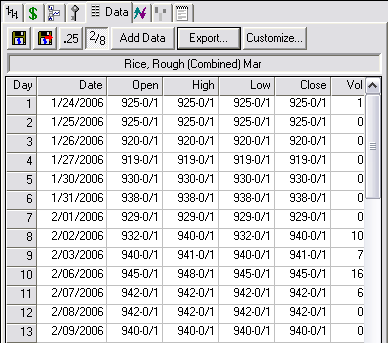
Track 'n Trade Pro determines the most appropriate format for displaying
the data in the Data tab and elsewhere in the software.
Customizing the Data Tab
To customize the Data tab, click on the Data tab in the Control Panel.
Click on the "Customize button" and the Customize window will open. In
this window you can select which data is displayed in the Data tab. The
default settings are to display values for the Date, Open, High, Low,
Close, Volume, and Open Interest. To change the data column display
order, use the + or - keys on your keyboard to move the selected item up
or down in the list.
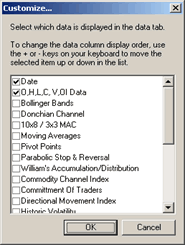
To import additional data, see the Importing Data section later
in this chapter.
Back To Top
Key Tab
The Key tab is the tab with the graphic that looks like a Key. Click on the tab
and it will expand to say "Key" as you see in the screen shot below. The Key Tab
displays the information from the exchanges on the contract that you are
currently viewing in the Chart Window. See what each value represents below.
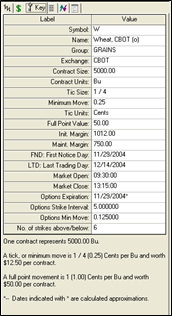
Symbol: Gecko Software's symbol for the commodity. For the most part the symbologies match the Exchange as much as possible.
Name: Short name including an indication of the session type. Types include (o)
for open outcry, (c) for combined, and (e) for electronic.
Group: The group is similar to a category for commodities. For example, Wheat is
a member of the "Grains" group.
Exchange: The exchange is where the commodity's trades are processed. Sometimes
a primary exchange will be listed with a subsidiary exchange, i.e. NYMEX/COMEX.
Contract Size: The number of units that one contract represents.
Contract Units: The unit of measurement.
Tick Size: The tick size is defined by an exchange as the smallest increment the
quote of a contract will fluctuate. This is also called the minimum move or a
point.
Minimum Move: The same as Tick Size, but is displayed as a decimal value instead
of a fraction.
Tick Units: The unit of measure for quotes. This unit should be the same as the
unit that the Exchange uses. However, Gecko Software uses a different unit than
the Exchange, the full point value will be adjusted so that all accounting is
correct.
Full Point Value: This value represents what a move in the ones place is worth.
For the few commodities that trade in whole values, this is the same as the
minimum move. Generally it represents several minimum moves.
Init. Margin: The initial margin is the amount an exchange and your brokerage
firm requires available in your account at the end of the first day your order
is filled in the market.
Maint. Margin: The maintenance margin is the amount of available funds required
to be in your account at the end of each trading day after the first day your
order is filled. It is generally a smaller amount than the initial margin.
First Notice Day (FND): Depending on the exchange, this date can indicate
various rules that have come into effect. Overall this is a warning that the
contract will expire soon. This value is different per contract and applies to
the contract that is currently open in the Chart Window.
Last Trading Day (LTD): This is the last day that you can trade the contract
month that is currently open.
Market Open: The time that the market opens. This time is the Exchange's time
zone as listed on the Exchange's web site.
Market Close: The time that the market closes. Like market open, it is in the
Exchange's time zone. Time is in 24 hours, so 13:30 is 1:30PM. (Subtract 12
hours from values greater than 12:00.)
Options Expiration: The date that options for the active contract will expire
worthless or be automatically exercised into futures orders.
Options Strike Interval: The value for the minimum spacing between options, as
listed by the Exchange.
Options Min. Move: This is the value of the minimum price fluctuation for the
options contract. This is similar in function to the futures minimum move.
No. of strikes above/below: The value used to calculate strikes above the
highest high and below the lowest in generated Black and Scholes data.
Below this table of key values is a description of the units used, the
calculations for the minimum move, and the full point movement.
Firewalls
A firewall is a piece of software or hardware that protects your computer from
other people accessing your computer from the Internet. A firewall only allows
basic types of Internet and network communications, such as surfing the
Internet. When you log onto the Internet or your network, it is possible to be
open to attacks from other people. Although attacks are rare, they do pose a big
enough threat to warrant the protection of a firewall.
Track 'n Trade Pro uses a special utility "FIDO" to download the current market
data and update the charts. FIDO does not use conventional means to download the
data in order to speed up the downloading process. Because of this, Track 'n
Trade Pro may encounter problems downloading through the firewall. It may appear
that the downloader is idle for a long period of time and then it will display
an error stating it could not find the server. This is because the firewall does
not allow the server to send the new data to your computer.
Track 'n Trade Pro has a new feature to allow for both standard and non-standard
methods for downloading data. The standard method uses Port 80 which is accepted
by most firewalls as regular traffic, but this method is slower. The
non-standard method uses Port 60184 and will need to have an exception made in
order for this method to work with a firewall; this method is much faster than
Port 80 in downloading data.
Configuring Track 'n Trade Pro for Firewalls:
1. Click on the Data Update button from the main Toolbar, which will start FIDO.
2. Click on the button located in the far right called "Options".
This will open a new window where you can select which method to download data.
3. If you are working behind a firewall, select "Port 80", and then click the
"OK" button.
4. Once done, click the "Dismiss" button to close FIDO.
5. Restart FIDO by clicking on the "Data Updates" button to download using Port
80.
Back
To Top |